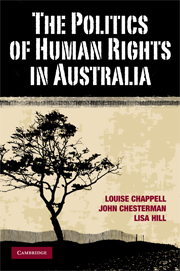Book contents
- Frontmatter
- Contents
- Acknowledgements
- List of abbreviations
- Introduction
- 1 Human Rights
- 2 Protecting Human Rights
- 3 A Bill of Rights?
- 4 Electoral Rights in Australia
- 5 The Rights of Indigenous Australians
- 6 Gender and Sexuality Rights
- 7 Refugees
- 8 Civil and Political Rights in an Age of Terror
- Notes
- Index
- References
8 - Civil and Political Rights in an Age of Terror
- Frontmatter
- Contents
- Acknowledgements
- List of abbreviations
- Introduction
- 1 Human Rights
- 2 Protecting Human Rights
- 3 A Bill of Rights?
- 4 Electoral Rights in Australia
- 5 The Rights of Indigenous Australians
- 6 Gender and Sexuality Rights
- 7 Refugees
- 8 Civil and Political Rights in an Age of Terror
- Notes
- Index
- References
Summary
Liberal democracies hold individual lives as ends in themselves with all people equally entitled to protection and preservation. These liberal-democratic rights and protections were fought for with much blood and toil over many centuries in order to control and limit the use of violence occurring horizontally between citizens and vertically between citizens and the state. The history of liberal democracy has been a protracted and concerted effort to dissolve political absolutism and establish in its place limited government and rule of law through an elaborate system of checks and balances. Such checks and balances not only protect citizens from arbitrary interference but also ensure open and accountable government. And yet, despite the prolonged and hard-won provenance of this fragile system, in times of perceived emergency, liberal-democratic majorities have generally proved to be less concerned with abridgements of rights (perhaps because they cause more harm to minorities) than with their own security. As a consequence, liberal-democratic states have tended to overreact and curtail freedoms too hastily (Ignatieff 2004, ix). Australia is no exception and might even be described as an emblematic case.
Among lawyers and academics, the dominant view is that the federal laws enacted to fight the war on terror, so-called, have significantly damaged Australian democracy. A common presumption is that our precious and hard-won liberal-democratic rights should, as a matter of course, trump the collective need for security (hereafter conceived of as the ‘liberal-democratic soul-protection position’, the soul of liberal-democracy being not only the rights and freedoms embodied in liberal-democratic norms, practices and laws, but also an enduring collective commitment to their defence).
- Type
- Chapter
- Information
- The Politics of Human Rights in Australia , pp. 221 - 251Publisher: Cambridge University PressPrint publication year: 2009



